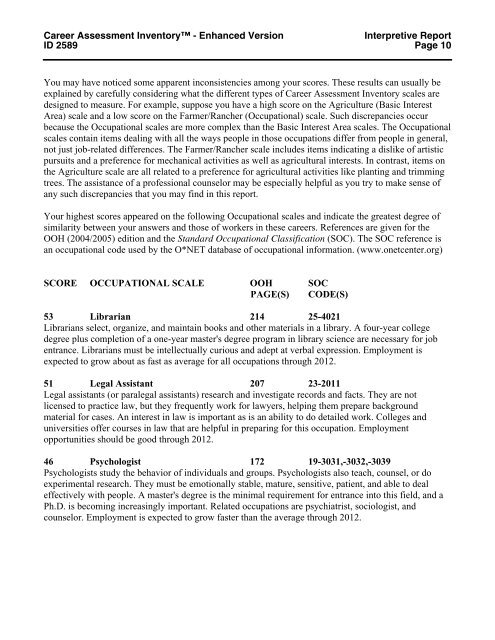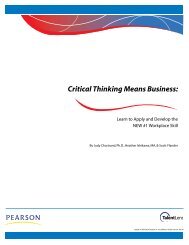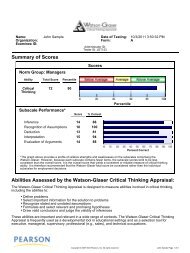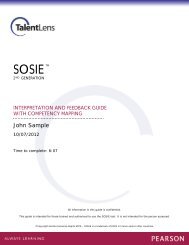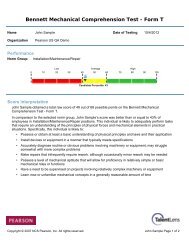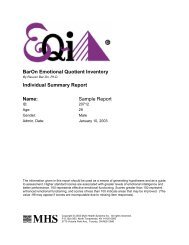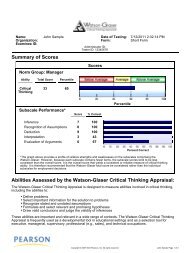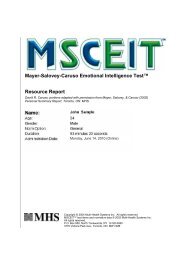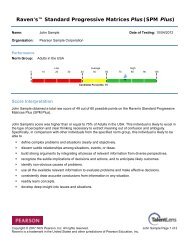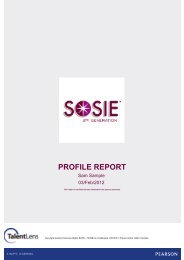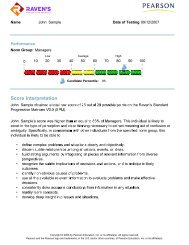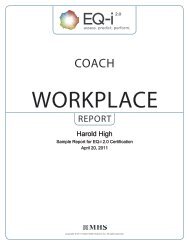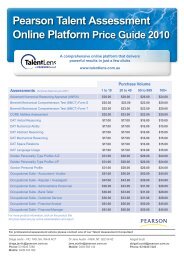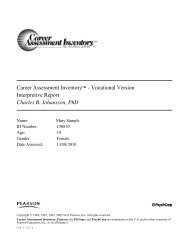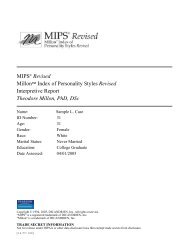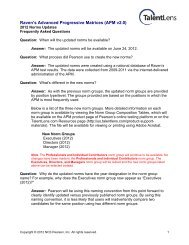CAI Enhanced Sample Interpretive Report - TalentLens
CAI Enhanced Sample Interpretive Report - TalentLens
CAI Enhanced Sample Interpretive Report - TalentLens
You also want an ePaper? Increase the reach of your titles
YUMPU automatically turns print PDFs into web optimized ePapers that Google loves.
Career Assessment Inventory - <strong>Enhanced</strong> Version <strong>Interpretive</strong> <strong>Report</strong><br />
ID 2589 Page 10<br />
You may have noticed some apparent inconsistencies among your scores. These results can usually be<br />
explained by carefully considering what the different types of Career Assessment Inventory scales are<br />
designed to measure. For example, suppose you have a high score on the Agriculture (Basic Interest<br />
Area) scale and a low score on the Farmer/Rancher (Occupational) scale. Such discrepancies occur<br />
because the Occupational scales are more complex than the Basic Interest Area scales. The Occupational<br />
scales contain items dealing with all the ways people in those occupations differ from people in general,<br />
not just job-related differences. The Farmer/Rancher scale includes items indicating a dislike of artistic<br />
pursuits and a preference for mechanical activities as well as agricultural interests. In contrast, items on<br />
the Agriculture scale are all related to a preference for agricultural activities like planting and trimming<br />
trees. The assistance of a professional counselor may be especially helpful as you try to make sense of<br />
any such discrepancies that you may find in this report.<br />
Your highest scores appeared on the following Occupational scales and indicate the greatest degree of<br />
similarity between your answers and those of workers in these careers. References are given for the<br />
OOH (2004/2005) edition and the Standard Occupational Classification (SOC). The SOC reference is<br />
an occupational code used by the O*NET database of occupational information. (www.onetcenter.org)<br />
SCORE OCCUPATIONAL SCALE OOH SOC<br />
PAGE(S) CODE(S)<br />
53 Librarian 214 25-4021<br />
Librarians select, organize, and maintain books and other materials in a library. A four-year college<br />
degree plus completion of a one-year master's degree program in library science are necessary for job<br />
entrance. Librarians must be intellectually curious and adept at verbal expression. Employment is<br />
expected to grow about as fast as average for all occupations through 2012.<br />
51 Legal Assistant 207 23-2011<br />
Legal assistants (or paralegal assistants) research and investigate records and facts. They are not<br />
licensed to practice law, but they frequently work for lawyers, helping them prepare background<br />
material for cases. An interest in law is important as is an ability to do detailed work. Colleges and<br />
universities offer courses in law that are helpful in preparing for this occupation. Employment<br />
opportunities should be good through 2012.<br />
46 Psychologist 172 19-3031,-3032,-3039<br />
Psychologists study the behavior of individuals and groups. Psychologists also teach, counsel, or do<br />
experimental research. They must be emotionally stable, mature, sensitive, patient, and able to deal<br />
effectively with people. A master's degree is the minimal requirement for entrance into this field, and a<br />
Ph.D. is becoming increasingly important. Related occupations are psychiatrist, sociologist, and<br />
counselor. Employment is expected to grow faster than the average through 2012.


